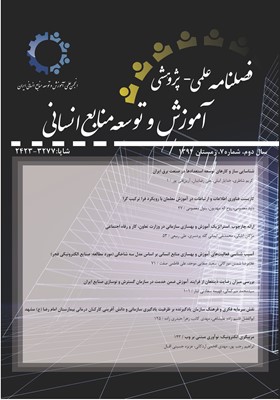بررسی میزان رضایت ذینفعان از فرایند آموزش ضمنخدمت در سازمان گسترش و نوسازی صنایع ایران
محورهای موضوعی :سیدمحمد میرکمالی 1 , فهیمه سعادتی تبار 2
1 -
2 -
کلید واژه: فرایند آموزش آموزش ضمنخدمت رضایت ذینفعان,
چکیده مقاله :
تحقيق حاضر با هدف «بررسی میزان رضایت ذینفعان از فرایند آموزش ضمنخدمت در سازمان گسترش و نوسازی صنایع ایران» به روش توصيفي- تحليلي صورت گرفته است. جامعه آماری شامل ذینفعان فرایند آموزش ضمنخدمت سازمان گسترش و نوسازی صنایع ایران میباشد که در 9 ماهه اول سال 93 در دورههای آموزشی کوتاهمدت سازمان شرکت کرده و شامل کارکنان سازمان، مدیران و معاونان سازمان و مدیران شرکتهای تابعه میباشد که در مجموع 1249 نفرند که با استفاده از روش نمونهگیری طبقهای نسبتی و تصادفی ساده 143 نفر به عنوان نمونه انتخاب شدند. برای گردآوری اطلاعات از پرسشنامه محققساخته استفاده شد و پس از تأیید خبرگان و اساتید دانشگاهی به صورت مقدماتی اجرا و پایایی آن با محاسبه آلفای کرونباخ برآورد شد (89/.=α ). برای تجزیه و تحلیل دادهها از نرمافزار SPSS و از روشهای آماری توصیفی (فراوانی، میانگین، نمودار و ...) و آمار استنباطی (آزمون تی تکنمونهای، تی گروههای مستقل و تحلیل واریانس یکطرفه) استفاده شد. همچنین برای رتبهبندی نظرات شرکتکنندگان در دورههای آموزشی در خصوص سنجش میزان رضایت از فرایند آموزش از آزمون فریدمن استفاده گردید. یافتهها نشان داد که رضایت ذینفعان از تمامی مراحل فرایند آموزش ضمنخدمت (نیازسنجی، طراحی، اجرا، ارزشیابی و بازخورد) در حد متوسط میباشد و بیشترین میزان رضایت به ترتیب از مرحله بازخورد از دورههای آموزشی، اجرای دورههای آموزشی، ارزشیابی از دورههای آموزشی، طراحی دورههای آموزشی و نیازسنجی دورههای آموزشی است. همچنین در این پژوهش مشخص شد که بین میزان رضایت ذینفعان از فرایند آموزش بر حسب متغیرهای جمعیتشناختی (جنسیت، سمت سازمانی، میزان تحصیلات و سابقه خدمت) تفاوت معنیداری وجود ندارد
Taking the importance of training process in contemporary world into account, the present study has dealt with the level of satisfaction of the stakeholders from the in-service training process in Iranian Industries Development and Renovation Organization of Iran (IDRO). Considering the objective and questions of the research, this study is of a descriptive-survey type. The statistical population of this research consists of the stakeholders of the in-service training who participated in the organization’s short term training courses and include employees, managers and deputies of the organization and the managers of subsidiaries which totally amount to 1249 people who were selected and 143 people out of that number were selected as the sample of study using a random and classified sampling method. The researcher-made questionnaire was used for gathering information and it was implemented as first stages after gaining the approval of the esteemed supervising and advising professors and its reliability was measured by means of calculating Cronbach’s Alpha =(./87). For data analysis, SPSS software and also inferential statistics (T test single sample, T test of independent subjects and one-way variance analysis) were used. Also, to rank the participants comments regarding the assessment of satisfaction level from the training process, Friedman test was employed. The results obtained demonstrated that there is an average level of satisfaction among all the stakeholders from all stages of in-service training process (assessment of needs, design, implementation, evaluation and feedback) and the highest level of satisfaction has been from feedback phase taken from the training courses, implementation of training courses, evaluation of training courses, design of training courses and need assessment of training courses respectively. In addition, it became evident in this research that there is no significant difference between the stakeholders’ level of satisfaction from training process in terms of demographic variables (gender, organizational position, and the level of education and service records).
